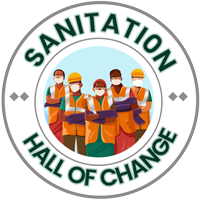Before landing in WSH, Aasim used to work for a construction company in Mumbai. Wanting to do something more meaningful that leaves behind a lasting impact, he decided to pursue Town Planning from CEPT University. Urban services, like water and sanitation, fascinated Aasim and led him to join the Centre for Water and Sanitation (CWAS), where he has been for 13 years. Through his experience, he has come to recognize WSH services as critical public goods.
Associated with CWAS since 2010, Aasim has extensive experience in WSH across India, Nepal, and Africa. He leads CWAS' work in supporting sanitation programs in small and medium towns in Maharashtra, focusing on City Wide Inclusive Sanitation and Faecal Sludge and Septage Management (FSSM). He provides technical support to the Maharashtra government for Swachh Bharat Mission in urban areas. He is passionate about working towards efforts to mitigate climate change through WSH.
Aasim believes that inclusivity has a non-negotiable place in sanitation service delivery, and it cannot be fragmented but must be city-wide, self-financed, and self-monitored. For him, strengthening existing systems is at the core of inclusivity. To be truly inclusive, safe sanitation services must reach every household, especially those in hard-to-reach areas with high population density and cramped roads.
A thrilling initiative Aasim led as part of CWAS is “scheduled desludging”, which carries out regular or periodic services instead of being demand-based, implemented in Maharashtra. This first-of-its-kind initiative in India has helped improve the quality of and conserve water. To make the concept more relatable to people when first introduced in 2013, they compared it to Ghanta Gaadi, which does daily door-to-door waste collection from households. Instead of being daily, scheduled desludging would occur once every three years. The analogy was a game-changer in building political will and getting the initiative implemented!
This journey of doing what it takes to translate powerful ideas from the bookshelf to the ground and scaling them keeps Aasim driven. Being surrounded by a community of experts, as part of the NFSSM Alliance, has played an instrumental role in helping Aasim and CWAS scale efforts. Aasim believes that even though CWAS has strong relationships with the government, it has a much more significant impact when 30+ organizations come together to approach the government.
The Alliance has been pivotal in shifting the focus from toilets to the entire sanitation value chain and promoting inclusivity in SBM. For Aasim, engaging in the NFSSM Alliance has been a personal and professional triumph. Motivated by this community, Aasim continues inspiring others with his innovative solutions to help people adopt WSH services.

